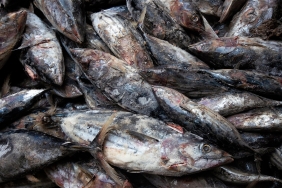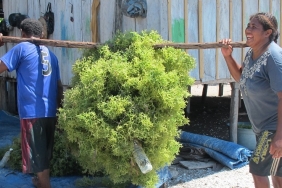TRAWL FISHING GEAR THREATENS SUSTAINABILITY OF MARINE RESOURCES
Jakarta - Facts from the field presented by WWF-Indonesia today (2/2) in Jakarta titled 'Assessment of Trawl Fishing Gear in Indonesia', shows that fishing gear of the type trawls is still rampant in Indonesian waters.
In 1980, Indonesia became one of the countries in the world that encouraged sustainable management of marine resources. At that time, the government issued Presidential Decree (Keppres) Number 39 of 1980 concerning the Elimination of Trawls in the Waters of Java, Sumatra and Bali; in order to maintain habitat health and productivity of traditional fishermen. In the last two decades, however, trawls have proliferated in various forms and names, all referring to their environmentally unfriendly nature. The use of trawls by dredging the bottom of the water to destroy habitat and the use of small meshes also leads to the capture of various types of biota that are still juvenile or immature.
"The biggest challenge now is to stop the rate of ecosystem damage and degradation of fisheries resources that have reached overfishing status, which is partly caused by the productivity of the use of trawl," said Abdullah Habibi, Manager of Capture and Aquaculture Fisheries Improvement, WWF-Indonesia.
In addition, the study presented by WWF-Indonesia also shows that the percentage of shrimp and fish as the target catch of trawls ranges from 18-40% of the total catch composition, while the rest is bycatch (bycatch) which is not of high economic value and will be discarded (discarded). The exploitation status of fish resources from the Decree of the Minister of Marine Affairs and Fisheries No.45/2011 states that the potential for demersal fish resources has reached the status of overexploited (fully exploited), one of which is caused by helicopter trawling, and the potential for shrimp resources is in the status of overfishing (overfishing).
"The issuance of Ministerial Regulation No. 2/2015 to completely stop the use of trawl type fishing gear in Indonesian waters is the right step, because this fishing gear contributes greatly to the destruction of marine habitats, wastes marine resources, affects the life cycle of marine biota, and threatens the population of key biota that maintain the balance of nature, such as turtles and sharks," continued Habibi.
To restore the carrying capacity of fisheries, a strategic and implementable approach is needed to all stakeholders. Improving the management of the fisheries sector must be built on an ecosystem basis by strengthening effective fisheries governance. Capacity building and nurturing fishermen are also urgently needed so that the fishery products produced have competitiveness and added value.
For more information, please contact:
Abdullah Habibi, Capture and Aquaculture Fisheries Improvement Manager, WWF Indonesia
Email: ahabibi@wwf.or.id, Hp: +62 811 8114193.





